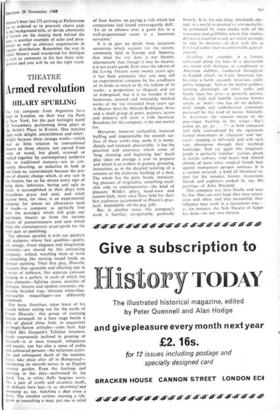THEATRE
Armed revolution
HILARY SPURLING
I he TSE company from Argentina have been in London, on their way via Paris to New York, for the past fortnight (until '6 November), performing three plays at the Artist's Place in Euston. One watches them with delight, astonishment and relief: delight because these strange works—which hear as little relation to conventional theatre as those objects, not carved from stone or wood, but glued, screwed or ttelded together by contemporary sculptors bear to traditional statuary—are so con- stantly diverting, so seductive to look at and listen to; astonishment because the pro- .ess of drastic change which, at any rate in [he theatre, has so far shown every sign of being slow, laborious, boring and ugly to ■ tatch, is accomplished in their plays with miraculous grace and ease; and relief because here, for once, is an experimental .ompany for whom no allowances need ,e made—a company as perfectly free iron.] the nostalgia which still grips our legitimate theatre as from the various ,,rands of pretentiousness and cant which make the contemporary avant-garde for the most part so punishing.
The obvious parallel is with our painters and sculptors whose best qualities—gaiety, ,pit, energy, visual elegance and imaginative authority—are shared by this entrancing .ompany: indeed, watching them at work something like moving round inside an ,hstract painting. Their first play, Dracula, recounts that agreeable and affecting tale in [ series of tableaux, like separate canvases longing in a gallery, in each of which the ,arne elements—lighting, music, snatches of dialogue, bizarre and opulent costumes, ela- ,orately braided wigs, intricate white-blue- and-scarlet - maquillages—are differently -omposed.
Our hero, Jonathan, takes leave of his riends before setting out for the castle of Count Dracula: this group of reclining rig.ures arranged, on a bare stage beside a dish of glazed china fruit. in exquisitely In-Anglo-Saxon attitudes—arms bent, legs [(tided like Gauguin's Tahitian islanders, heads courteously inclined in greeting or farewell—is at once tranquil, voluptuous and exotic; one has also a sense of polite and cultivated persons—the nefarious activi- ties and subsequent death of the vampire, I ucy, take place after all in Hampstead- aonversing on smooth turves in an English -ountry garden. Even the fetching and marrying in this play—performed by the maid. Tsu, in white, fluffy leggings worn, like a pair of costly and eccentric muffs, on delicate bare legs—is as abcorbineabd mnosing as. say, watching a deer cross a lawn. The simplest actions. opening a tele-
gram or consulting a map, put one in mind of Jane Austen, on paying a visit which her companions had found extravagantly dull: 'To sit in idleness over a good fire in a well-proportioned room is a luxurious sensation.'
It is in part no doubt these luxurious sensations which account for the notion, commonly held in Europe and America, that what the TSE does is not theatre; alternatively that, though it may be theatre, it is not avant-garde. Ever since the advent of the Living Theatre some twenty years ago, it has been axiomatic that you may tell an experimental company by the scruffiness of its looks as much as by the tedium of its works: a proposition so illogical, and yet so widespread, that it is no wonder if the humorous, assured and intricately finished works of the TSE (founded three years ago in Buenos Aires by Alfredo Rodriguez Arias and a small group of poets, painters, actors and dancers) still seem a trifle heretical. Boredom, for this company, is the one mortal foe.
Moreover, however outlandish, however baffling and impenetrable the smooth sur- face of these works may seem, it is imme- diately and intensely pleasurable: it has the precision and assurance which come of 'long choosing and beginning late' (each play takes on average a year to prepare) and which is as evident in gesture, grouping, intonation, as in the detailed tailoring of a costume or the elaborate building of a shoe. The whole has the pure, heady, intoxicat- ing pleasure of originality, something avail- able only to contemporaries—the kind of pleasure Wilde's plays,. hand-sewn and custom-built, must once have held for their first audiences accustomed to Pinero's prac- tical, dependable off-the-peg jobs.
But, in another sense, this company's work is familiar, recognisable, positively homely. It is, for one thing. absolutely dry: and, in a world so devoted to sentimentality. so permeated by mass media with all the vagueness and gullibility which that implies. dryness is essential to any art which attempts to take its measure—to deal with life as it is lived rather than in comfortable general- isations.
Goddess, for example, is a fantasy concocted along the lines of a spectacular sex movie with dialogue, in compliment to American dubbers, conducted throughout in English which, on Latin American lips, becomes a harsh, uncouth, ferocious, oddly gothic language. And as the lustful goddess. looming alarmingly on stilts, stalks and finally slays her prey—a perfectly passive, flaccid, frail and humble creature known simply as 'male'—one has all the delights. both simple and sophisticated, commonly purveyed by this kind of movie. Similarly, in Avenutras, the raucous energy of the pop-singer bawling in the wings—'She's gonna go, go, go . . .!'—is both enhanced and slyly contradicted by the rigorously formal movements of 'character' and 'nar- rator', stepping so delicately and with such rapt absorption through their mythical landscape. And yet again this imaginary jungle is perfectly familiar: ravines gleam in acrylic colours, wild beasts lurk behind clumps of neon tubes, tropical fronds beat against transparent perspex surfaces. It is a curious reversal, a kind of theatrical re- turn for the temples, forests, mysterious islands and explorers evoked in. say, the paintings of John Hoyland.
This company was here briefly and seen by few. One can only hope they may return, soon and often, and that meanwhile their influence may work in a mysterious way— as, for instance, the Noh Theatre of Japan has done—on our own theatre.










































 Previous page
Previous page